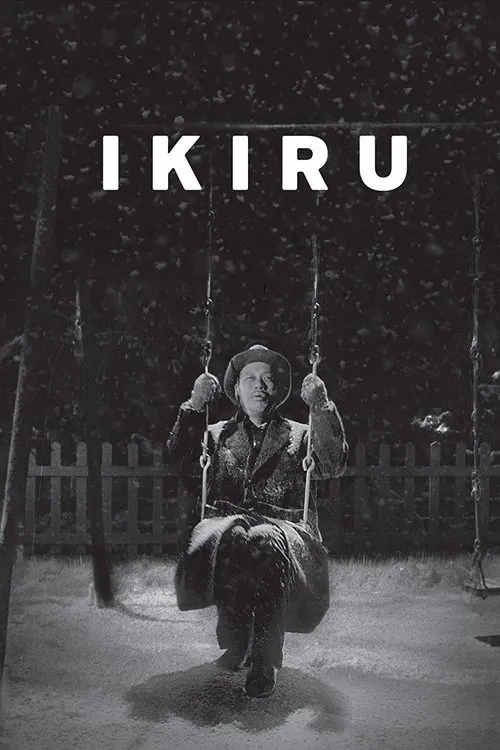生きる

あらすじ
戦後の日本、貧困、荒廃、官僚の非効率さに悩まされる国において、絶望感が蔓延している。絶望の海の中で、渡辺勘治(志村喬演)という中年男性が、人生の目的を見つけようと奮闘している。平凡な官僚の仕事に没頭し、渡辺の日々は情熱や興奮を欠いた単調なものへと成り下がっていた。 映画の冒頭で、渡辺は末期癌であるという衝撃的な知らせを受ける。まるでこの診断が彼が切実に必要としていた目覚まし時計であるかのように、渡辺は人生の意味を再発見する旅に出る。しかし、それは幸福や満足を求める探求ではない。むしろ、平凡な男の苦闘をほとんど気にかけないように見える世界で、何らかの目的を見つけようとする必死の試みなのである。 渡辺の存在は、東京市役所の息苦しい官僚的な環境に閉じ込められており、彼は無関心で無頓着な人々の海の中で苦労している。彼の同僚もまた、変化と改革の明白な必要性にもかかわらず、有意義な行動を起こせず、その機関を蝕む無気力さに屈している。渡辺もまた、長年にわたってこのシステムの一員であり、真の価値観や願望を見失ってしまっている。 渡辺が市役所の陰鬱な風景を歩むにつれて、彼は自分だけの世界に閉じ込められているように見える人々に囲まれていることに気づく。市の政治家たちは、市の住民を苦しめる差し迫った問題に対処するよりも、自分たちの権力と現状維持を維持することに関心を持っている。渡辺のような官僚は、この機械の中に閉じ込められ、単調さと非効率さのサイクルに永遠に縛られている。 しかし、渡辺の最近の診断と新たな目的意識は、彼に自身の存在を再評価させる。彼は異なる目で世界を見始め、都会の不毛な風景に命を吹き込む小さくて重要な細部に気づく。彼は子供たちが遊ぶ近くの公園を訪れる。それは、道に迷ってしまったように見える社会における希望と喜びの象徴である。彼は周りの人々、彼らの苦闘と勝利を観察し、単なる統計に還元されてしまった人々とのつながりを形成し始める。 渡辺の変容は緩やかなものである。それは小さな反抗行為から始まり、現状に疑問を呈し、長年彼を押し込めてきたシステムに挑戦し始める。彼は、イノベーションと進歩を阻害する官僚的な縄張りにますます気づいていく。彼は自身の存在を深く掘り下げるにつれて、自分を取り巻く人々の人生と苦闘の相互関係を見始める。 渡辺の旅を形作る重要な関係の一つは、朋江という若い女性との絆である。苦労しているシングルマザーである朋江の存在は、渡辺が当然のこととしてきた快適さと安心感とはかけ離れている。渡辺は彼女を知るにつれて、人生の単純な美しさ、存在を有意義にする苦闘と勝利に感謝し始める。 最終的に、渡辺の意味の探求は無益なものとなる。彼はこの地上での時間がなくなっていることを知っている。それでも、新たな目的意識に駆り立てられ、前進し続ける。彼の遺産である子供のためのコミュニティセンターは、人間のつながりと生きる意志の力の証となる。年月が経つにつれて、センターは繁栄し、渡辺の精神は生き続け、彼を知るすべての人々に、最も暗い瞬間でさえ、より良い明日への希望が常にあることを思い出させる。 黒澤明の『生きる』は、目的を提供しないように見える世界で、目的を見つけようとする男の苦闘を描いた力強い探求である。渡辺の旅を通して、映画は人生の意味、人間関係の重要性、遺産の価値について根本的な問いを提起する。最後に、渡辺勘治の物語は、最も平凡な人生の中にも偉大さの可能性が秘められていること、人間の精神の永続的な力の証であることを痛切に思い出させる。
レビュー
Gavin
He dies halfway through the film, yet he is reborn halfway through the film. Happy birthday to you! He has been dead for thirty years at the beginning of the movie, but by the end, he achieves immortality with every swing of the playground swing. The structure is a classic: the first half is like a mummy's solitary quest for the meaning of life, while the elevated second half quietly observes the myriad expressions of death among the living (thus shifting the meaning of life and death from the individual to broader society). It's as if the order of life and death is inverted, perfectly aligning with the film's theme. It delivers the most scathing social commentary with a gentle demeanor, leaving those present speechless. A great film.
Lorenzo
Ikiru! A culmination of life and humanity, in this film, Akira Kurosawa reached the zenith of his spiritual world. The spiritual definition of life and death, the sharp satire of the government, the deep analysis of human nature, and the thorough reflection on life are all so profound and moving. I personally believe that this film represents the highest peak of Kurosawa's filmography. I am grateful to have witnessed such a soul-stirring classic. Takashi Shimura's performance deserves the same high praise as Mifune's. This is also the only film that Toshiro Mifune didn't participate in from the beginning of his collaboration with Kurosawa until their eventual separation. Even after 50 years, it still resonates deeply.
Summer
Ikiru is a magnificent film. Even setting aside its pointed exposé of the apathy within the Japanese government of the time, it remains a towering achievement in its depiction of the awakening of the human spirit. Moreover, the film's very structure is enough to classify it as a masterpiece, standing as a successor to Rashomon and a precursor to 12 Angry Men. The recurring theme, encapsulated in the song "Life is Short / Maiden, Fall in Love / While your red lips are still warm / Before your passion fades / For none knows what tomorrow holds," resonates with a poignant blend of pessimism and proactive living.
Lilah
The first half is introspection, the second a satire. The key takeaway is that many are incorrigible and unmoved. However, the son's scenes are quite intriguing; the memorial service is entirely speechless. Despite being his father, he was always an unfamiliar figure.



